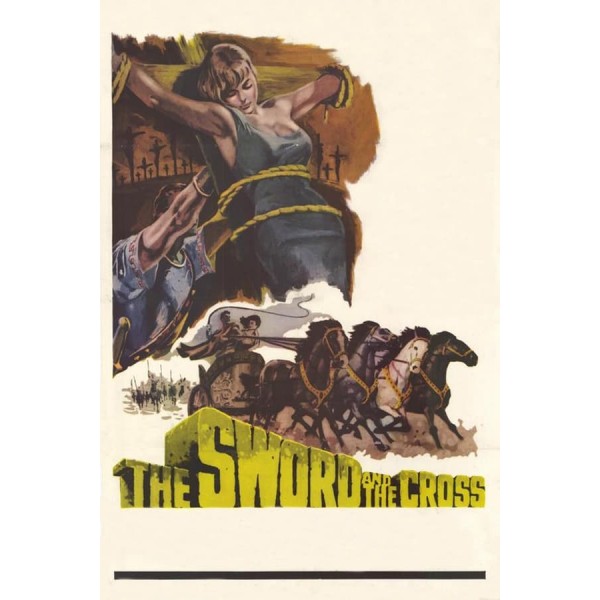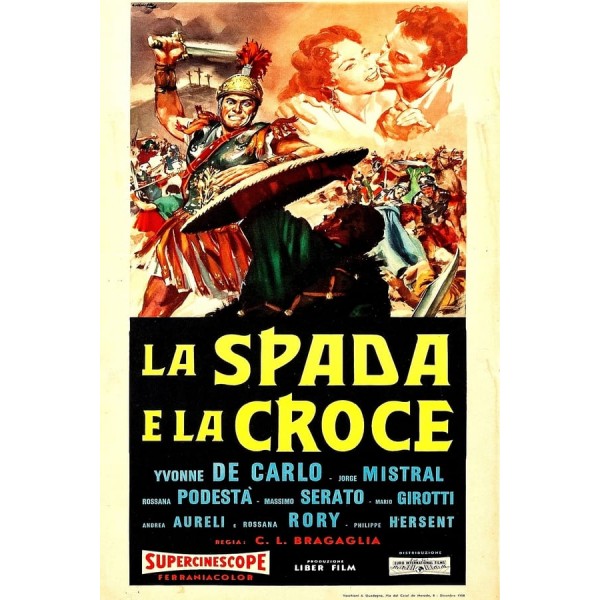Escravas de Cartago - 1956
- Diretor Guido Brignone
- Código: NA-2094-EPI-LT
- Pontos: 1
- Disponibilidade: Em estoque
Opções disponíveis
Tarso, na província romana da Cilícia, em 120 DC. Duas irmãs cartaginesas, Lea e Ester, são compradas como escravas pelo tribuno romano Marcus Valerius, que as dá de presente à orgulhosa Júlia Martia, filha do procônsul. Ambiciosa, gananciosa e vingativa, Julia está noiva do cínico Flavius Metellus, um membro do Senado, mas na verdade ela está apaixonada por Marcus. No entanto, ele prefere a doçura simples de Lea, o que leva Julia à crueldade e à vingança. O procônsul é assassinado por Flavius Metellus, que se torna seu sucessor. Acreditando que os cristãos foram os responsáveis pela morte de seu pai, Julia, agora a esposa do novo procônsul, ordena o início das perseguições. Marcus recebe a ordem de realizar a campanha, mas, diante da coragem e da fé dos cristãos, percebe que eles são inocentes. Ele é preso após ser traído por um pastor e se junta às duas irmãs nas masmorras. Lea é torturada e cega após se recusar a divulgar o esconderijo dos cristãos remanescentes. Marcus e os outros são condenados à morte, mas seus homens o libertam a tempo de impedir que os cristãos sejam queimados vivos. Na batalha sangrenta que se segue, Julia e seu marido são mortos e os cristãos são libertados. Marcus, agora também cristão, é proclamado novo procônsul e toma Lea por esposa. Embora cega, ela guiará o marido com a doçura de sua alma e a luz da fé que a salvou. mas seus homens o libertam a tempo de evitar que os cristãos sejam queimados vivos. Na batalha sangrenta que se segue, Julia e seu marido são mortos e os cristãos são libertados. Marcus, agora também cristão, é proclamado novo procônsul e toma Lea por esposa. Embora cega, ela guiará o marido com a doçura de sua alma e a luz da fé que a salvou. mas seus homens o libertam a tempo de evitar que os cristãos sejam queimados vivos. Na batalha sangrenta que se segue, Julia e seu marido são mortos e os cristãos são libertados. Marcus, agora também cristão, é proclamado novo procônsul e toma Lea por esposa. Embora cega, ela guiará o marido com a doçura de sua alma e a luz da fé que a salvou.
| Ficha Técnica | |
| Título Original | Le schiave di Cartagine |
| Ano | 1956 |
| Título no Brasil | Escravas de Cartago |
| Idioma | Italiano |
| Legenda | Ingles, Português |
| Cores | Colorido |
| Gênero | Drama |
| Duração | 87 Min. Aprox. |
| Direção | Guido Brignone |
| Países de origem | Itália |
| Elenco | Gianna Maria Canale, Jorge Mistral, Marisa Allasio, Ana Luisa Peluffo, Rubén Rojo, Luigi Pavese, Germán Cobos |
| Curiosidades | |
| Você Sabia? | Este filme foi uma co-produção entre Itália, Espanha e México, e foi filmado em widescreen (Cine-total-scope) em italiano, nos Cinecittà Studios, em Roma. Cinecittà Studios (Cinema City Studios), é um grande estúdio de cinema em Roma, com uma área de cerca de 100 hectares. |

